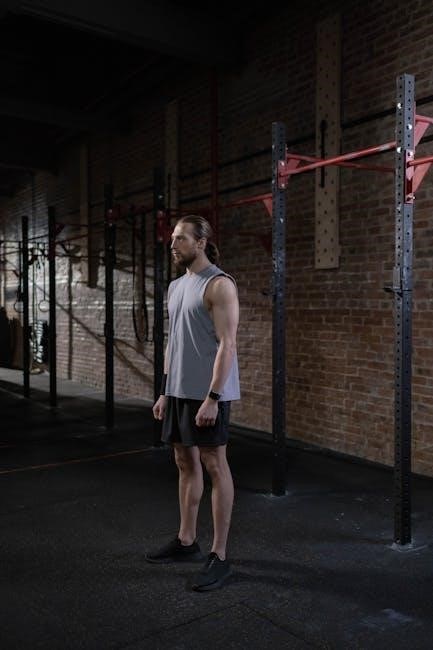Understanding the Serious Health Condition Form in Colorado
The Serious Health Condition Form in Colorado is a critical document for FMLA and FAMLI applications, detailing medical conditions requiring leave, available as a PDF.
The Serious Health Condition Form is a document used to certify medical conditions requiring leave under the Family and Medical Leave Act (FMLA) and Colorado’s FAMLI program. It is essential for employees or family members needing time off due to a serious health issue. The form, available as a PDF, must be completed by a licensed healthcare provider to verify the condition’s severity and its impact on the individual’s ability to work or care for a family member. It plays a critical role in ensuring compliance with federal and state leave laws.
Purpose of the Form
The Serious Health Condition Form serves to certify medical conditions that qualify employees or their family members for leave under the FMLA and Colorado’s FAMLI program. Its primary purpose is to provide documentation supporting the need for medical leave due to a serious health issue. The form ensures eligibility for benefits by verifying the severity of the condition and its impact on the individual’s ability to work or care for a loved one.
It also streamlines the process for employers to evaluate leave requests and comply with federal and state regulations, ensuring fair and consistent application of leave policies.
Relevance to Colorado State Laws
The Serious Health Condition Form aligns with Colorado’s Family and Medical Leave Insurance (FAMLI) program and federal FMLA regulations. It ensures compliance with state-specific requirements for medical leave, providing a standardized method to certify health conditions. The form is essential for verifying eligibility under Colorado’s paid family and medical leave laws, enabling employees to access benefits while caring for themselves or family members with serious health issues. It integrates seamlessly with Colorado’s legal framework, ensuring fair and lawful application of leave policies statewide.

Eligibility Criteria for the Serious Health Condition Form
The form is for Colorado employees and family members with serious health conditions, aligning with FAMLI and FMLA. It verifies eligibility for medical leave benefits.
Who Can Use the Form?
The Serious Health Condition Form is designed for Colorado employees and their family members requiring medical leave due to a serious health condition. Employees may use it to certify their own medical conditions, while family members can use it to care for a spouse, parent, or child with a serious health condition. The form is essential for both FMLA and Colorado’s FAMLI program. It applies to workers needing time off for medical treatment or caregiving responsibilities, ensuring eligibility for leave benefits under state and federal regulations.
Eligibility for Employees
Employees in Colorado are eligible to use the Serious Health Condition Form if they experience a medical condition requiring inpatient care or ongoing treatment. This includes illnesses, injuries, or impairments that prevent them from working. The form is essential for requesting leave under FMLA or FAMLI programs. Employees must provide detailed medical certification from a licensed healthcare provider, specifying the condition, treatment, and any work restrictions. This ensures compliance with state and federal regulations, safeguarding their leave benefits and job protection during recovery or caregiving periods.
Eligibility for Family Members
Family members of employees in Colorado may qualify for leave benefits if they experience a serious health condition. This includes spouses, children, or parents requiring care. The form must be completed by a licensed healthcare provider, detailing the condition, treatment, and need for care. Employees requesting leave for a family member’s condition must submit this certification to their employer. Colorado’s FAMLI program further supports such cases, ensuring eligible family members receive necessary medical leave protections under state and federal laws.

Key Components of the Serious Health Condition Form
The form includes sections for employee and healthcare provider details, a description of the condition, treatment, and certification of the serious health condition’s impact on daily activities.
Structure of the Form
The Serious Health Condition Form in Colorado is divided into clear sections, starting with employee and healthcare provider information. It includes a detailed description of the medical condition, duration, and treatment. The form requires certification from the healthcare provider, outlining the severity of the condition and its impact on the employee’s ability to work or care for a family member. This structured format ensures all necessary details are captured efficiently, making it user-friendly for both employees and healthcare providers to complete accurately.
Required Information
The Serious Health Condition Form requires detailed medical information, including the diagnosis, treatment, and prognosis of the condition. Employees must provide personal and employment details, while healthcare providers must certify the severity and duration of the condition. The form also asks for specific dates of treatment and any ongoing care requirements. Additionally, it includes sections to confirm the employee’s inability to work or care for a family member due to the condition. Accurate and complete information is essential to ensure proper processing of the application.
Sections to be Completed by the Employee
The employee must complete specific sections of the Serious Health Condition Form, including personal and employment details. Sections 1 and 2 require the employee’s name, contact information, and job-related data. The employee must also indicate the nature of their condition and provide the approximate start date of the serious health condition. Additionally, the form asks for information about the employee’s inability to work due to the condition. This section ensures the employee provides necessary background information for the healthcare provider to complete their part accurately.
Sections to be Completed by the Healthcare Provider
The healthcare provider must complete specific sections of the form to certify the serious health condition. This includes details about the diagnosis, treatment, and prognosis, as well as the start and expected duration of the condition. The provider must also indicate how the condition impacts the patient’s ability to work or perform daily activities. Additionally, the provider must confirm whether the condition requires ongoing medical care. The provider’s contact information and signature are also required to validate the certification. This ensures the medical necessity of the leave is properly documented.

How to Complete the Serious Health Condition Form
Completing the form involves collaboration between the employee and healthcare provider. Employees initiate the request, while providers certify medical details, ensuring compliance with FMLA and FAMLI requirements.
Step-by-Step Guide for Employees
Employees must start by reviewing the form and initiating the process with their employer. Complete Sections 1 and 2, providing personal and leave details. Ensure the healthcare provider accurately certifies the medical condition in Section 3. Submit the completed form to the appropriate party, such as the employer or FAMLI program. Maintain a copy for personal records and follow up to confirm receipt and processing status.
Step-by-Step Guide for Healthcare Providers
Healthcare providers must first review the form to understand the required information. Authenticate the patient’s condition through medical records or evaluations. Complete Section 3, detailing the nature of the condition, treatment, and prognosis. Include specific details about inpatient care or ongoing treatment if applicable. Sign and date the form to certify the information. Return the completed form to the employee or employer promptly. Ensure all information is accurate and meets FMLA and FAMLI requirements for eligibility.
Additional Documentation Requirements
Beyond the Serious Health Condition Form, healthcare providers may need to provide additional medical records or treatment plans. Employees must ensure all sections are complete and accurate. Employers may request supplementary documentation to verify the condition’s severity. Detailed treatment plans or progress reports could be required. Providers should maintain clear, concise records to support the certification. Ensuring compliance with FMLA and FAMLI regulations is essential. This step helps streamline the approval process and prevents delays in benefits eligibility.

Submitting and Processing the Form
The Serious Health Condition Form must be submitted to the employer, typically within 15 days. Processing usually takes 5-7 business days, but incomplete forms can delay approval. Follow-up with HR to ensure timely processing and verify receipt.
Where to Submit the Form
The completed Serious Health Condition Form should be submitted to the employer’s HR department or leave administrator. For Colorado FAMLI benefits, the form may also be required by state agencies. Ensure the form is sent to the designated office or online portal specified by the employer or Colorado FAMLI program. Timely submission is crucial to avoid delays in processing the leave request. Always confirm the submission method with the employer or relevant authority to ensure compliance with regulations.
Processing Time and Procedures
Once submitted, the Serious Health Condition Form is typically processed within 5-10 business days. Employers review the form for completeness and may request additional documentation. For Colorado FAMLI benefits, the state agency processes the application after receiving the form. Delays may occur if the form is incomplete or requires clarification. Employees should follow up with their employer or the FAMLI program to ensure timely processing. Proper completion of the form and adherence to submission guidelines help avoid delays in approving the leave request.
Follow-Up After Submission
After submitting the Serious Health Condition Form, it is crucial to follow up with the employer or the Colorado FAMLI program. Employees should confirm receipt of the form and inquire about the status of their leave request. Notification of approval or denial is typically provided within a few weeks. If additional information is needed, prompt responses are essential to avoid delays. Regular communication ensures the leave process remains on track, and any issues are resolved efficiently. Follow-up helps maintain clarity and ensures compliance with FMLA and Colorado state regulations.

Benefits and Protections Under FMLA
The FMLA ensures job protection and continued health insurance for eligible employees during their leave. It safeguards against discrimination and retaliation for taking medical leave.
Overview of FMLA Benefits
The FMLA provides eligible employees with up to 12 weeks of unpaid, job-protected leave for specific family and medical reasons. This includes caring for a newborn, a seriously ill family member, or the employee’s own serious health condition. During this period, employers must maintain the employee’s health insurance coverage under the same terms as if they were working. Upon return, employees are entitled to be reinstated to their previous job or an equivalent position. These protections ensure employees can address personal or family health needs without jeopardizing their employment status or benefits.
Protections for Employees
Under the FMLA, employees are protected from retaliation or denial of job opportunities when requesting leave for a serious health condition. Employers cannot interfere with or deny rights granted by the FMLA, ensuring employees can take necessary leave without fear of negative consequences. These protections apply when the leave is for the employee’s own serious health condition or to care for a qualified family member, provided the condition is certified by a healthcare provider. This safeguard ensures job security and continued access to benefits during approved leave periods.
Protections for Family Members
Under the FMLA and Colorado-specific regulations, family members of employees are protected when the employee takes leave to care for them. The Serious Health Condition Form ensures that employees can take leave to care for a spouse, parent, or child with a serious health condition without facing retaliation. Employers must maintain job security and continue providing health benefits during the leave period. These protections apply when the form is properly completed by a healthcare provider, ensuring the employee’s entitlement to care for their loved ones is upheld. This safeguard promotes work-life balance and supports families during challenging times.

Colorado-Specific Regulations and Benefits
Colorado offers paid family and medical leave through FAMLI, providing benefits for employees and their family members with serious health conditions, beyond federal FMLA protections.
Colorado Family and Medical Leave Insurance (FAMLI)
Colorado’s FAMLI program provides paid family and medical leave benefits to eligible workers. To qualify, employees must submit a serious health condition form, certifying their need for leave. This form, often in PDF format, is completed by a healthcare provider and details the medical condition requiring leave. FAMLI offers benefits for employees caring for themselves or family members with serious health conditions. Unlike federal FMLA, FAMLI includes paid benefits and does not require a waiting period. It also expands eligibility to more workers, ensuring broader access to medical leave benefits statewide.
Additional State-Specific Benefits
Colorado offers expanded benefits beyond federal FMLA, including paid family and medical leave through FAMLI. The state-specific program provides wage replacement for eligible workers needing time off for serious health conditions. Additionally, Colorado broadens the definition of family members, allowing leave for a wider range of relatives. The serious health condition form is essential for accessing these benefits, ensuring employees can care for themselves or loved ones while maintaining financial stability. These enhancements make Colorado’s leave policies more comprehensive and supportive for workers.
Interplay Between FMLA and Colorado State Laws
The Serious Health Condition Form aligns with both FMLA and Colorado’s FAMLI program, ensuring compliance with federal and state regulations. While FMLA provides unpaid leave, Colorado’s FAMLI offers paid benefits for eligible workers. The form is crucial for accessing both programs, as it certifies the medical necessity for leave. Colorado’s laws often expand on federal protections, providing broader definitions of family and qualifying conditions. This interplay allows employees to benefit from both federal and state-level protections, ensuring comprehensive support during medical or family-related leave periods.

Common Challenges and Mistakes
Common challenges include incomplete form submissions, certification errors, and delays in processing, often due to missing or inaccurate information provided by employees or healthcare providers.
Common Errors in Form Completion
Common errors include incomplete sections, missing signatures, and inaccurate medical details, leading to delays or rejections. Employees often omit required information or fail to obtain proper healthcare provider certifications. Vague descriptions of the serious health condition can cause processing issues. Additionally, incorrect or incomplete employer information and failure to submit supporting documentation are frequent mistakes. Ensuring all fields are filled accurately and submitting the form on time is crucial to avoid complications. Consulting official guidelines or seeking legal advice can help mitigate these errors.
Delayed or Denied Applications
Applications may be delayed or denied due to incomplete or inaccurate information on the Serious Health Condition Form. Missing signatures from healthcare providers or employees can cause processing delays. Vague or insufficient medical details often lead to requests for additional documentation. Incorrect or incomplete employer information may also result in rejection. Failure to submit required supporting documents or missed deadlines can further complicate the process. Ensuring all sections are completed accurately and submitting the form on time is essential to avoid such issues and ensure timely approval of benefits.
Disputes and Appeals
Disputes over the Serious Health Condition Form may arise if applications are denied or delayed due to incomplete or inaccurate information. Employees or family members can appeal such decisions by providing additional documentation or clarifications. Healthcare providers may need to revise or expand their certifications to address discrepancies. Legal consultation is recommended to navigate complex cases. Ensuring all form sections are accurately completed and adhering to Colorado’s FAMLI guidelines can help minimize disputes and facilitate a smoother appeals process for eligible individuals seeking medical leave benefits.

Legal Implications and Employer Responsibilities
Employers must legally accept and process the Serious Health Condition Form, ensuring compliance with FMLA and Colorado state laws to avoid penalties and legal disputes.
Employer Obligations Under FMLA
Under the FMLA, employers must accept and process the Serious Health Condition Form (WH-380-E or WH-380-F) to certify an employee’s or family member’s medical condition. Employers are required to notify employees of their FMLA rights and ensure confidentiality of medical information. They must also maintain health benefits during leave and reinstate employees to their prior or equivalent position upon return. Failure to comply with these obligations can result in legal penalties and disputes, emphasizing the importance of proper handling of FMLA certifications.
Employer Responsibilities in Colorado
In Colorado, employers must adhere to both FMLA and state-specific regulations, such as FAMLI. They are required to accept and process the Serious Health Condition Form for leave requests. Employers must provide eligible employees with up to 12 weeks of unpaid, job-protected leave for serious health conditions. Additionally, they must maintain health insurance benefits during leave and ensure reinstatement to the same or equivalent position. Colorado employers are also obligated to comply with FAMLI, which may provide paid leave benefits for eligible employees.
Consequences of Non-Compliance
Non-compliance with FMLA and Colorado-specific regulations can result in legal consequences for employers. Failure to process the Serious Health Condition Form properly may lead to lawsuits, fines, and penalties. Employers may face reputational damage and loss of trust from employees. Additionally, non-compliance can result in mandatory reinstatement of employees, back pay, and damages for lost benefits. Employers must ensure adherence to both federal and state laws to avoid these repercussions and maintain a compliant workplace environment.

Resources and References
Official government websites provide downloadable PDF forms for Colorado’s Serious Health Condition, including WH-380-E and WH-380-F, along with guides for FAMLI benefits and legal support.
Official Government Websites
Official government websites, such as the U.S. Department of Labor and the Colorado Department of Labor, provide access to downloadable PDF forms for the Serious Health Condition certification. These websites offer detailed instructions for completing forms like WH-380-E (for employee conditions) and WH-380-F (for family member conditions). Additionally, they provide guidance on Colorado-specific benefits, such as FAMLI, and ensure compliance with FMLA regulations. These resources are essential for both employees and healthcare providers seeking accurate and up-to-date information.
Forms and Downloads
The Serious Health Condition Form for Colorado is available as a downloadable PDF from official government websites. Forms such as WH-380-E (for employee conditions) and WH-380-F (for family member conditions) are standardized and fillable. Additionally, Colorado-specific forms like the Medical Certification Form for family members can be accessed. These documents are essential for FMLA and FAMLI applications, ensuring compliance with federal and state regulations. Users are advised to download these forms from trusted sources to avoid errors or inconsistencies in submission.
Legal Consultation and Support
Seeking legal consultation is crucial for ensuring compliance with FMLA and Colorado-specific regulations. Legal experts can provide guidance on completing the Serious Health Condition Form accurately. They can also help resolve disputes or address denied applications. Additionally, legal support ensures that both employees and employers understand their rights and obligations under Colorado’s FAMLI program. Consulting with a legal professional can prevent misunderstandings and facilitate a smooth process for medical leave applications. Legal resources are available through official government websites and specialized law firms.
The Serious Health Condition Form is essential for FMLA and FAMLI applications in Colorado, ensuring compliance and validating medical leaves with detailed healthcare provider input.
Final Thoughts on the Serious Health Condition Form
The Serious Health Condition Form is a vital tool for ensuring compliance with FMLA and Colorado-specific regulations. It provides necessary medical documentation for leave requests, protecting both employees and employers. Proper completion by healthcare providers and employees ensures validity. The form’s structured format, including sections for diagnoses and treatment plans, streamlines the application process. Accessible as a PDF, it remains a user-friendly resource for navigating medical leave. Adhering to its requirements ensures smooth processing under FMLA and FAMLI. Always consult official sources or legal experts for guidance if unsure.
Importance of Compliance
Compliance with the Serious Health Condition Form is essential to ensure adherence to FMLA and Colorado-specific regulations. Proper completion and submission guarantee legal validity, preventing delays or denials of benefits. Employers and employees must follow guidelines to avoid penalties or disputes. Compliance protects worker rights, maintains employer accountability, and ensures seamless processing of leave requests. Accurate documentation and timely submissions are critical to uphold the integrity of the application process under Colorado’s FAMLI program and federal FMLA standards.
Future Updates and Changes
Stay informed about updates to the Serious Health Condition Form, as Colorado and federal regulations evolve. The Department of Labor and state authorities periodically review and revise forms to align with legal changes. Future updates may expand eligible conditions, streamline processes, or enhance digital submission options. Employers and employees should monitor official sources for revisions to ensure compliance. Proactive awareness of form updates helps maintain accurate submissions and prevents potential issues under FMLA and FAMLI programs.



